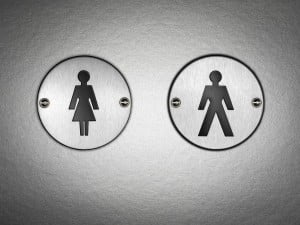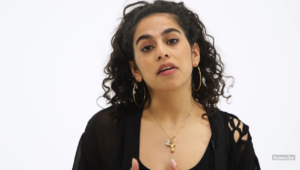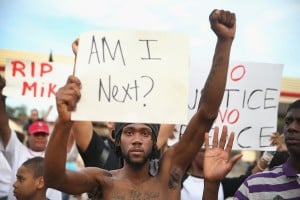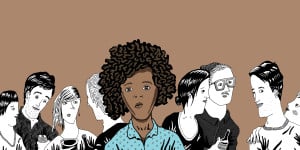
Closeup on a person with red hair and a nose piercing looking down with a sad expression.
Sandra Bland, Kayden Clarke, Trayvon Martin, and Aiyana Jones were all citizens, yet they were violently taken from this world. The police did not protect their lives; neither did the court system, or their neighbors. Citizenship proved to be of no favorable factor on their deaths.
We are in a state of emergency where a transgender person is murdered every 29 hours; an unrest where an unarmed Black man is killed at five times the rate to an unarmed white man; a state so violent that people with disabilities inhabit one of the highest poverty levels recorded thus far in the United States.
And because there is so much injustice in the world, it may seem like citizenship should be the least of our concern.
As a visibly Black and queer body, I have always felt unprotected because people like myself have a history of being killed in our very own neighborhoods, sometimes on the door of our “homes” – something that happened too often in my low-income neighborhood of East Boston, and later in my life, on the outskirts of New York City.
However, not having “legal” immigration status made me realize that being a non-citizen meant that I had no chance of being protected by the court system, the health system, and the prison industrial complex.
Citizenship privilege exists and it matters, a lot, because every oppression a person faces is an intersectional oppression, meaning that it is perpetuated by multiple powers and institutions.
Citizenship privilege is hard to understand by those who are citizens, because oftentimes, citizenship privilege is something a person is born with, which means that that person may have never in their life had to think about their status as a US citizen and how that affects how they move through their world.
What Is Citizenship?
Being a US citizen means that a person has a United States passport and a social security number. Some citizens will also have a US birth certificate, a US state-issued license, and/or other form of identification.
A US citizen has documents (literally, pieces of paper) that prove that they were either born on US soil, and thus, their citizenship was recognized by the country, or that they were naturalized and became citizens by taking a citizenship test or through a young adoption.
Sometimes, citizenship privilege is an automatic (unearned) privilege that people have, as people who are born in the United States automatically receive citizenship. Other times, people who have had legal help, and the financial stability to apply for citizenship, become citizens.
Why Is Citizenship Important?
Since we have citizens, we also have non-citizens, who are usually categorized as “aliens.” The category of “alien” already creates the allusion that a person does not belong, and that an immigrant is someone to be feared.
Because of this citizen/non-citizen binary, it’s crucial to have a conversation of what privileges a citizen receives, and how some of those privileges are relying on the dehumanization of non-citizens.
A non-citizen (alien) is someone who was born in another country, or someone who doesn’t have documentation of their birth, and therefore, no proof that they were born on US soil. A non-citizen can also be an adopted individual who hasn’t been naturalized, a refugee, a person seeking political asylum in the United States, or an undocumented immigrant (someone who doesn’t have a visa to be in the United States).
All of these people can be deported at any minute, be hunted by Immigration and Custom Enforcement, and be shipped to a private immigration facility that makes money per night that they hold immigrants, regardless of whether the immigrant is documented or undocumented.
As long as there are bodies inside the detention facility, the facility is making such high revenue out of inmates that they’re encouraged to continue detaining migrants for no reason, except that they are not US citizens.
Undocumented people, in particular, are those who are the most marginalized for not being citizens.
Because undocumented people don’t have citizenship, they’re considered invisible and non-existent, which means that the government can get away with torture, hyper incarceration, and deportation without the events ever making the news, because technically, the people suffering don’t exist.
‘The Law Is the Law’ and ‘Illegal Is Illegal’
I’m tired of “the law is the law” being the first phrase that comes out of the mouth of someone who disagrees with me on the notion that, regardless of citizenship status, people should be treated with humanity.
If we believe that “the law is the law” and that “illegal is illegal,” then we agree that the genocide of indigenous people was okay – because it was legalized by the colonizers.
We then agree that slavery was absolutely fine, because it was legal. With slavery, we agree that Negroes should have never been educated, because that was illegal; we also agree that child labor was a perfect labor law, because it was legal.
It’s clear that the law has been used to dehumanize communities and to create catastrophic violence that we still can’t recuperate from. So I want to push our analysis of the legal system and encourage everyone to think independently, past binaries of “legal” and “illegal.”
If we move away from the one-dimensional analysis that “the law is the law” and that “illegal is illegal,” we may be able to have more nuanced conversations about the liberation of all oppressed communities.
Undocumented immigrants are not “illegal immigrants.” Undocumented immigrants are people that have been illegalized by the same systems that legalized the transatlantic slave trade – white supremacy, capitalism and colonialism.
There are a lot of anti-immigrant sentiments in our current culture, and I have to be honest: I really don’t believe that people can be innately anti-immigrant.
Let me start by asking: Why are people fearful of undocumented immigrants?
My best attempt at answering this question is by saying that a lot of US citizens believe the myth that undocumented people are stealing “American” jobs, and as Donald Trump has convinced himself and his followers, the myth that immigrants are “killers and rapists.”
In fact, a few weeks ago, I wrote an article about the ways in which “the rhetoric of xenophobia teaches us to only celebrate and empathize with white immigrants.” This is represented in our media and in forcing us to celebrate holidays like Thanksgiving and Presidents Day, which rely on repressing the history of genocide and slavery.
Many people are anti-immigrant because the media instills fear in the minds of working class communities, portraying immigrants as the root cause of our contemporary economic crisis.
This, it seems, is easier than digging at the actual roots by focusing on the way corporations create poverty, or the way in which people in power gain their wealth at the expense of creating a perpetual cycle of poverty for low-income people. (For more resources on how the media creates anti-immigrant notions in US citizens, you can look here, here, and here.)
At best, I want to say that one shouldn’t be ashamed of having citizenship privilege, but we have to be conscious of what it means, and the way in which citizenship is dependent on the oppression of non-citizens.
To start, here are some everyday examples of citizenship privilege that people need to be aware of.
1. You Won’t Face the Everyday Fear of Deportation
Did you know that undocumented immigrants are only one group of non-citizens that can be deported? In fact, about 10% of legal permanent residents are deported each year. And of these 10%, more than half are deported for nonviolent crimes, such as accumulating parking tickets that haven’t been paid for.
In addition, people that are seeking political asylum in the US are often deported because their cases are deemed as low-priority.
For example, some immigration judges have denied political asylum to transgender immigrants and other LGBTQIA+ immigrants from Mexico, because some states in Mexico have approved same-gender civil marriages.
As an immigration activist, I’ve heard many stories of transgender womyn who are denied political asylum, deported, and found dead shortly after.
2. You Will Never Be Denied Housing on the Basis of Being an Immigrant
As part of the housing application process, many landlords and homeowners now ask not only for proof of income, but for proof of immigration status, too.
My family has been denied housing dozens of times because the only government-issued IDs we can present are our foreign passports. Unfortunately, our statuses as non-citizens limit our accessibility to finding housing.
When citizens simply send over their state ID, drivers license, or US passport to potential landlords, they unknowingly indulge in citizenship privilege.
3. You Won’t Be Threatened with Deportation By Your Employer
Part of US citizenship is government protection from work exploitation.
The reality is that many non-citizens are coerced by their employers and forced to work in inhumane conditions. Employers get away with this type of treatment because they understand that, as citizens, they have control of employees who are non-citizens.
And if they want, they can call Immigration and make complaints, or make up lies to have them removed from the United States.
When I lived in Boston, I left three jobs within two or three weeks of being hired because I noticed that my employer would sign me out of the computer hours before my shift was over, and I would end up getting paid for less than what I was working for.
Upon confronting them, one told me something along the lines of, “You’re lucky I hired you. If you’re not happy, leave. But if you stay, no more complaining – or I’ll call Immigration and tell them you’re a threat.”
A US citizen can’t be threatened with being reported to Immigration.
4. You Can Leave the Country – And Be Admitted Back
International travel is actually a huge privilege: US citizens can leave the country for as long as they wish and be admitted back in once they arrive.
For non-citizens, this is often not a possibility.
For example, if an immigrant in the US is here on a visa on the basis of suffering abuse inside the country, and the immigrant must leave to their home country because a family member is dying, the immigrant might not be admitted back to the US – because they’re considered to have abandoned their immigration case.
This exact situation is true to undocumented immigrants, temporary protective status holders, deferred action for childhood arrivals holders, political asylum seekers, refugees, and more.
5. You Have Access to Seeing Your Family Members – In or Out of the Country
Many non-citizens cannot go back home.
For example, my mother hasn’t seen her own mother in almost twenty years because if my mother leaves, her petition for political asylum will be denied.
In our contemporary US immigration system, it can take decades for someone to finish their legal case and hear back from immigration on whether or not they’ll be considered for residency, and then citizenship.
6. You Have the Right to Sponsor Family Members Born Outside the US
Many people who are not US citizens have family members in other countries, family members who they cannot help come to the US.
I have a half-sister in Mexico that I’ve never met. Ideally, I would like to meet her, and have her visit me in the United States.
But as someone who isn’t a citizen, I don’t have the privilege to sponsor her and bring her to the States.
***
Talking about citizenship privilege shouldn’t be confused for the end goal being for everyone to be a citizen.
The end goal should be to abolish the citizen/non-citizen binary – because no one will ever be liberated from the violence that a faulty immigration system has created.
For now, we should continue to challenge each other, and work towards the abolition of borders, of prisons, of capitalism, and of citizenship in order to get closer to the liberation of our communities.
[do_widget id=’text-101′]
Alan Pelaez Lopez is a Contributing Writer for Everyday Feminism and an Afro-Indigenous migrant that grew up in Boston via La Ciudad de México, documenting their existence as an (un)docuqueer poet, jewelry designer, and a huge Frida Kahlo fan. Alan is currently in graduate school pursuing a degree in Comparative Ethnic Studies in the Bay Area, and a member of Familia: Trans, Queer Liberation Movement.
Search our 3000+ articles!
Read our articles about:
Our online racial justice training
Used by hundreds of universities, non-profits, and businesses.
Click to learn more




















